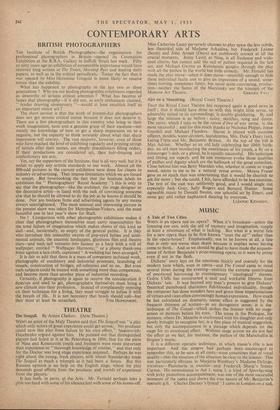THEATRE
The Seagull. By Anton Chekov. (Arts Theatre.) WHEN an actor of the Maly Theatre said that The Seagull was "a play which only actors of great experience could get across. No producer could save this play from failure by his own effort," Nemirovich- Danchenko argued against him. He pointed out that distinguished players had failed in it at St. Petersburg in 1896, that for the parts of Nina and Konstantin youth and freshness were more important than experience or "thorough knowledge of routine," and that only for the Doctor was long stage experience required. Perhaps he was right about the young, fresh players, with whom Stanislaysky made The Seagull as much a triumph as it had been a fiasco. But this Russian opinion is no help on the English stage, where the play demands great efforts from the producer and, worlds of experience from the players.
It has both, in parts, at the Arts. Mr. Fernald perhaps tries a little too hard with some of his silences and with some of his noises-off. Miss Catherine Lacey perversely chooses to play upon the less subtle, less theatrical side of Madame Arkadina, but Frederick Leister (Sorin) and John Arnatt (Dorn) are stubbornly correct at all the crucial moments. Jenny Laird, as Nina, is all freshness and wide- eyed charm, but cannot add the veil of pathos required in the last act, and Michael Gwynn as Konstantin Bangles through the play with all the pathos in the world but little comedy. Mr. Fernald has made the play move—when it does move—smoothly enough to hide these individual faults and to give an impression of a sound, some- times moving, sometimes funny, but never quite convincing, produc- tion—neither the fiasco of the Maryinsky nor the triumph of the Moscow Art Theatre. GERARD FAY.
• Airs on a Shoestring. (Royal Court Theatre.) THAT the Royal Court Theatre has reopened again is good news in itself ; that it should have done so with this bright little revue, so admirably suited to its surroundings, is doubly gladdening. By and large the mixture is as before : satire, sketches, song and dance. The satire, which I take to be the raison d'être of any revue, is the most successful ; and for this much thanks to Nicholas Phipps, Joyce Grenfell and Michael Flanders. Havoc is played with customs officers, models, water-diviners, launderettes, Mrs. Dale's Dairy (sic), Ealing Films and Mr. Benjamin Britten. At the top of the bill is Max Adrian. Whether as an old lady celebrating her 104th birth- day, an old man recollecting the sweetmeats of his youth, a fly on a fishmonger's slab, or a ghoul, he is equally successful. His technique and timing are superb, and he can moreover evoke those qualities of pathos and dignity which are the hallmark of the great comedian. Close behind him was Betty Marsden who, whether in comic or tragic mood, seems to me to be a natural revue artiste. Moyra Fraser gave us so much that was entertaining that it would be churlish to ask for more ; but she could, I felt, have afforded to be less cautious. The rest of the cast was uniformly good, and I would single out especially Jack Gray, Sally Rogers and Bernard Hunter. Some agreeable music by Donald Swann, one splendid set by Emett, and some gay and rather haphazard dancing by everyone. LUDOVIC KENNEDY.


































 Previous page
Previous page